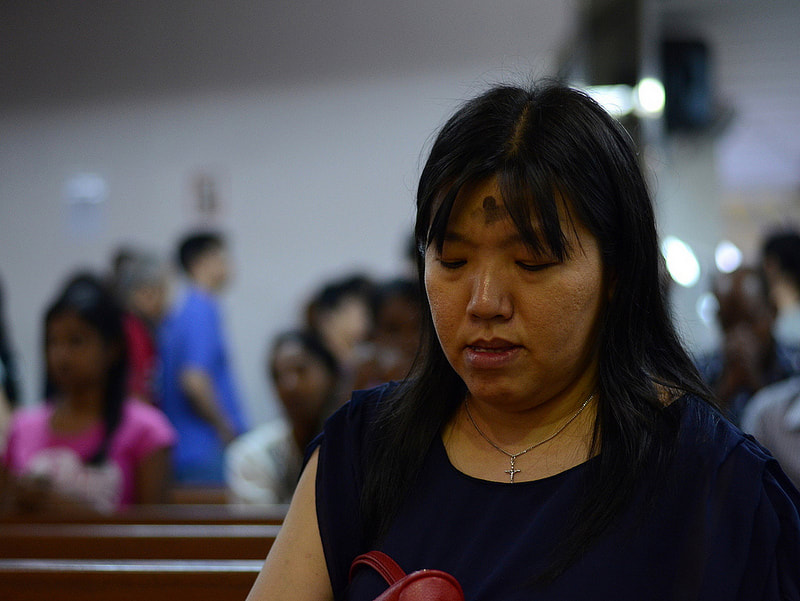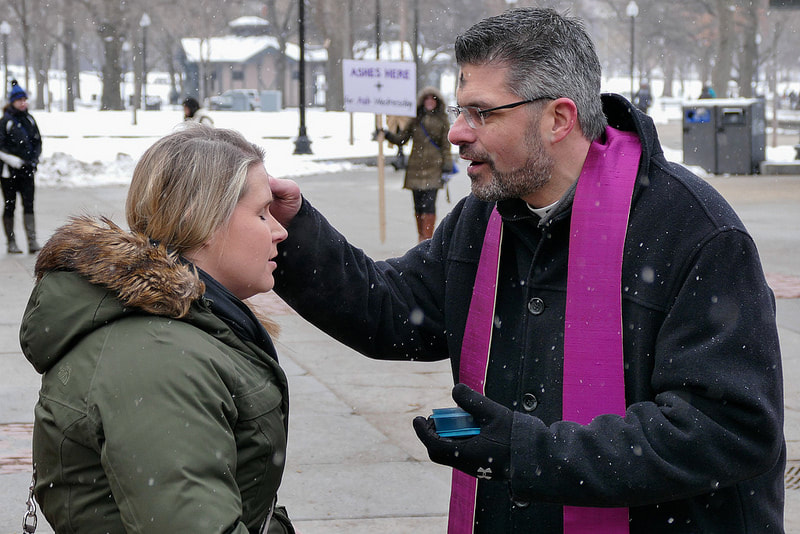- Home
- Process Worldview
- Community
- Art and Music
- Whitehead and Process Thinking
- Podcasts
- Spirituality
- Ecological Civilization
- Education
- Contact
- Social Justice
- Science
- Animals
- Sacred Poems
- Whitehead Videos
- Index of All Titles
- Practicing Process Thought
- Process Spirituality: A Spiritual Alphabet
- Recent Posts
Finding Grace in a Bowl of Ashes
by Teri Daily
In his book Telling the Truth: The Gospel as Tragedy, Comedy, and Fairy Tale, Frederick Buechner tells of Henry Ward Beecher’s 1872 trip to Yale to deliver the first Beecher lectures on preaching. Henry had been born into a noteworthy family. His father, Lyman Beecher, was a famous minister in whose honor the famous Beecher lectures had been established. His sister was Harriett Beecher Stowe. But Henry was also well-known in his own right. He was a social reformer—an advocate of women’s right to vote, of allowing Chinese immigration to continue, of the abolition of slavery, and of the theory of evolution. He was an amazing preacher by all accounts—the likes of Abraham Lincoln, Walt Whitman, and Mark Twain visited Plymouth Church in Brooklyn to witness his larger-than-life style in the pulpit. He traveled extensively, published a novel among other works, and had a family which included ten children.
But by the time Henry Beecher made his trip to Yale, things in his life seemed to be on the verge of crumbling. Whispered allegations of an affair with a married parishioner were beginning to become public. In fact, three years after this day there would be a public trial for adultery. And so as Henry stood facing the mirror that day in 1872, getting dressed to give the prestigious Beecher Lectures, what he saw staring back at him from the mirror was not an active reformer, a popular preacher, or a beloved family man. Instead, Frederick Buechner describes the scene in the hotel room that day like this:
When [Henry] stood there looking into the hotel mirror with soap on his face and a razor in his hand, part of what he saw was his own shame and horror, the sight of his own folly, the judgment one can imagine he found even harder to bear than God’s, which was his own judgment on himself, because whereas God is merciful, we are none of us very good at showing mercy on ourselves. Henry Ward Beecher cut himself with his razor and wrote out notes for that first Beecher Lecture in blood because, whatever else he was or aspired to be or was famous for being, he was a man of flesh and blood…[1]
Frederick Buechner says that the gospel is always bad news before it is good news. And what Henry Ward Beecher sees in the mirror is “bad news”—it is tragedy. It’s tragedy not because Henry is human, finite, and temporal; it’s tragedy because the darkness in the world and the darkness in Henry’s soul merge as he looks in that mirror. But here’s the thing: seeing that the darkness in the world is also the same darkness that is in us happens to be the very first step to hearing the good news. In fact, as Richard Rohr says: “Jesus has a lot of hope in sinners (which is good news for just about everybody, and why they call it so). Jesus only has problems with those who don’t think they are sinners. This turns all religious history upside down. The search for so-called purity is over. Now the only issue is honesty and humility. We call it by the hard word repentance.”[2] I like to think that Henry Ward Beecher’s long look in the mirror that day in 1872 was the beginning of honesty and humility, of repentance, of good news penetrating like light through a crack in the many layers of his false self.
Perhaps for Israel, hearing Isaiah’s words in our Ash Wednesday reading (Isaiah 58:1-12) is the equivalent of Henry Ward Beecher’s long look in the mirror. Israel has forgotten who she is, who she was created to be. Having recently returned from exile, Judah observes days of fasting and acts of piety—the people bow their heads, they lie in sackcloth and ashes. But they totally miss the grace of real repentance. God says to them: “Remember me? As you’ve gone about your lives and your practices, you’ve replaced my expectations with your own agenda, with the world’s agenda. But this is the fast that I choose—‘to loose the bonds of injustice, to let the oppressed go free…to share your bread with the hungry, and bring the homeless poor into your house.’” In other words, true repentance frees us from self-absorption and from our own agendas so that we can see other people as they really are—children of God. If we can’t do that, then we haven’t experienced real repentance.
Truth be told, it’s not hard to understand how Israel lost her moorings, or how Henry Ward Beecher lost his. In a world that bombards us with feedback, it’s easy to accept our identity as it is reflected back to us by those around us; it’s easy to search for our identity in the praise of others and in the expectations the world has of us. It’s all too easy to lose who we really are and what we were created for under the layers of false self that pile up around us over time.
And this is precisely where the grace of Ash Wednesday finds us. Ash Wednesday is the one day we get to be who we really are—no pretensions of grandeur, no burden of looking at ourselves through the eyes of everyone else, no need to pretend to be anything other than finite creatures of God whose days on this earth are limited and who are destined to have our share of failures along the way no matter how hard we try for things to be different.
Ash Wednesday and the season of Lent is the time we get to strip away all those accumulated layers of false self; we do the work of self-reflection and peel away the false assumptions about ourselves. And as we make our way back to the center of our being, we see ourselves again for who we truly are—beings wonderfully created out of the dust of the earth, beings who will one day return to the dust of the earth, imperfect beings who through the grace of God have been given this life and who only through the grace of God are given the gift of eternal life.
See, this day may be about our human condition, our mortality, and our need for forgiveness, but it is also, and more importantly, about the graciousness of God. Ash Wednesday may remind us who we are, but in a much larger way it reminds us who God is—a gracious God who loves us beyond anything we could ever earn or deserve.
And because that’s true, the honesty with which we approach this day leads not to despair, but to hope; it leads not to the chains of fear, but to the freedom of love; it leads not just to a look in the mirror, but through that look to the good news that embraces all of us. Who knew a bowl of ashes could hold that kind of grace?
[1] Frederick Buechner, Telling the Truth: The Gospel as Tragedy, Comedy. And Fairy Tale, New York: HarperSanFrancisco, 1977, page 2.
[2] Richard Rohr, Hope Against Darkness: The Transforming Vision of Saint Francis in an Age of Anxiety, Cincinnati: St. Anthony Messenger Press, 2001, page 74.
But by the time Henry Beecher made his trip to Yale, things in his life seemed to be on the verge of crumbling. Whispered allegations of an affair with a married parishioner were beginning to become public. In fact, three years after this day there would be a public trial for adultery. And so as Henry stood facing the mirror that day in 1872, getting dressed to give the prestigious Beecher Lectures, what he saw staring back at him from the mirror was not an active reformer, a popular preacher, or a beloved family man. Instead, Frederick Buechner describes the scene in the hotel room that day like this:
When [Henry] stood there looking into the hotel mirror with soap on his face and a razor in his hand, part of what he saw was his own shame and horror, the sight of his own folly, the judgment one can imagine he found even harder to bear than God’s, which was his own judgment on himself, because whereas God is merciful, we are none of us very good at showing mercy on ourselves. Henry Ward Beecher cut himself with his razor and wrote out notes for that first Beecher Lecture in blood because, whatever else he was or aspired to be or was famous for being, he was a man of flesh and blood…[1]
Frederick Buechner says that the gospel is always bad news before it is good news. And what Henry Ward Beecher sees in the mirror is “bad news”—it is tragedy. It’s tragedy not because Henry is human, finite, and temporal; it’s tragedy because the darkness in the world and the darkness in Henry’s soul merge as he looks in that mirror. But here’s the thing: seeing that the darkness in the world is also the same darkness that is in us happens to be the very first step to hearing the good news. In fact, as Richard Rohr says: “Jesus has a lot of hope in sinners (which is good news for just about everybody, and why they call it so). Jesus only has problems with those who don’t think they are sinners. This turns all religious history upside down. The search for so-called purity is over. Now the only issue is honesty and humility. We call it by the hard word repentance.”[2] I like to think that Henry Ward Beecher’s long look in the mirror that day in 1872 was the beginning of honesty and humility, of repentance, of good news penetrating like light through a crack in the many layers of his false self.
Perhaps for Israel, hearing Isaiah’s words in our Ash Wednesday reading (Isaiah 58:1-12) is the equivalent of Henry Ward Beecher’s long look in the mirror. Israel has forgotten who she is, who she was created to be. Having recently returned from exile, Judah observes days of fasting and acts of piety—the people bow their heads, they lie in sackcloth and ashes. But they totally miss the grace of real repentance. God says to them: “Remember me? As you’ve gone about your lives and your practices, you’ve replaced my expectations with your own agenda, with the world’s agenda. But this is the fast that I choose—‘to loose the bonds of injustice, to let the oppressed go free…to share your bread with the hungry, and bring the homeless poor into your house.’” In other words, true repentance frees us from self-absorption and from our own agendas so that we can see other people as they really are—children of God. If we can’t do that, then we haven’t experienced real repentance.
Truth be told, it’s not hard to understand how Israel lost her moorings, or how Henry Ward Beecher lost his. In a world that bombards us with feedback, it’s easy to accept our identity as it is reflected back to us by those around us; it’s easy to search for our identity in the praise of others and in the expectations the world has of us. It’s all too easy to lose who we really are and what we were created for under the layers of false self that pile up around us over time.
And this is precisely where the grace of Ash Wednesday finds us. Ash Wednesday is the one day we get to be who we really are—no pretensions of grandeur, no burden of looking at ourselves through the eyes of everyone else, no need to pretend to be anything other than finite creatures of God whose days on this earth are limited and who are destined to have our share of failures along the way no matter how hard we try for things to be different.
Ash Wednesday and the season of Lent is the time we get to strip away all those accumulated layers of false self; we do the work of self-reflection and peel away the false assumptions about ourselves. And as we make our way back to the center of our being, we see ourselves again for who we truly are—beings wonderfully created out of the dust of the earth, beings who will one day return to the dust of the earth, imperfect beings who through the grace of God have been given this life and who only through the grace of God are given the gift of eternal life.
See, this day may be about our human condition, our mortality, and our need for forgiveness, but it is also, and more importantly, about the graciousness of God. Ash Wednesday may remind us who we are, but in a much larger way it reminds us who God is—a gracious God who loves us beyond anything we could ever earn or deserve.
And because that’s true, the honesty with which we approach this day leads not to despair, but to hope; it leads not to the chains of fear, but to the freedom of love; it leads not just to a look in the mirror, but through that look to the good news that embraces all of us. Who knew a bowl of ashes could hold that kind of grace?
[1] Frederick Buechner, Telling the Truth: The Gospel as Tragedy, Comedy. And Fairy Tale, New York: HarperSanFrancisco, 1977, page 2.
[2] Richard Rohr, Hope Against Darkness: The Transforming Vision of Saint Francis in an Age of Anxiety, Cincinnati: St. Anthony Messenger Press, 2001, page 74.




